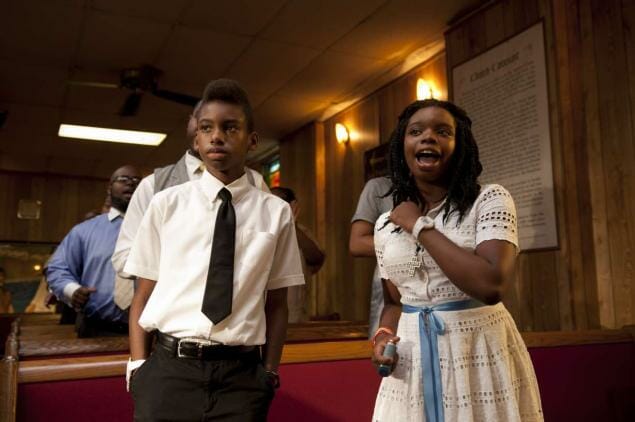Red Hook Summer

One could argue that Spike Lee’s strength as a director lies in his ability to construct a compelling story, where other great directors (and writers) are adept at surrendering themselves, in a way, to their work. Lee does not do this; his filmography shows that he is an activist through his art (Do The Right Thing, Malcolm X, When The Levees Broke, etc.) and—knowing this—viewers and critics allow his hand to bear down on his work far more than would normally be acceptable for a “good” film. For that very hand, Lee is revered and by that hand, his movies sometimes suffer. Red Hook Summer, Lee’s latest project about a boy who spends his summer in the Brooklyn Red Hook housing projects with a bible thumpin’ grandfather, may be the strongest example of why so many viewers and critics have a love/hate relationship with Lee and his movies.
Red Hook Summer begins much in the same way as Crooklyn and Do The Right Thing, two of Lee’s earlier works: the camera pans about a particular neighborhood, introducing the viewer to its everyday inhabitants. Instead of Mother Sister and Da Mayor, Red Hook Summer has characters like Mother Darling and Deacon Zee. The religious setting adds a slightly different element, but the characters are all-too familiar. We see this neighborhood through the eyes of Flik Royale (played by newcomer Jules Brown) a skateboarding pre-teen boy who shows up rocking a faux-hawk, his iPad ever in hand. Many of the first images of Red Hook are, in fact, shown through the lens of the Apple tablet, highlighting the generational, social and economic gap between Flik (who comes from a black middle class family in Atlanta) and this Brooklyn neighborhood, of which his grandfather (played by Clarke Peters) is a sort of patriarch.
Brown does not give an especially strong performance as young Flik, but this is partly due to the many clichés that inhabit every line he utters. He complains about doing chores, eating grandfather’s food, and missing the luxuries of his middle class lifestyle. After making a friend at his grandfather’s church, the scenes become far more difficult to watch. Lee recycles an abundance of Crooklyn clichés (i.e. “Stuuu-piiid!”) in the character of Chazz Morningstar (played by another poorly directed child actor, Toni Lysaith). As Chazz and Flik take on Red Hook, they find mischief and something that would have been young love if the acting were at all believable. One desperately wants their relationship to play as sweetly or as authentically as, say, the two young lovebirds in Moonrise Kingdom, or even last year’s Hugo. Chazz and Flik’s relationship is central to the movie, but all of their interactions are contrived moments that show neither young love nor adolescent adventure. Instead, they show only the heavy hand of a director looking for a way to address gentrification, Jesus and project living (topics that never get old, unless of course the same old things are being said about them).
-

-

-

-

-

-

-

-

-

-

-

-

-

-

-

-

-

-

-

-

-

-

-

-

-

-

-

-

-

-

-

-

-

-

-

-

-

-

-

-








































